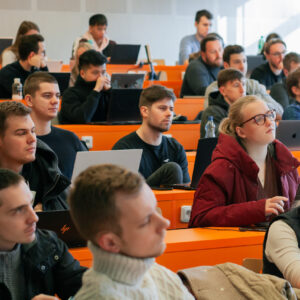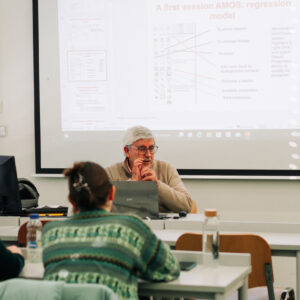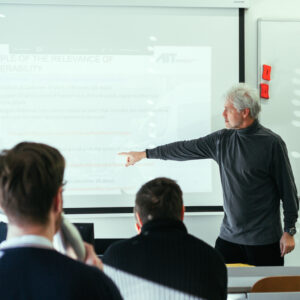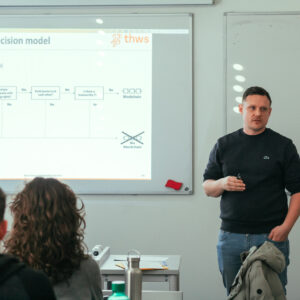I-Week 2023
International Week in numbers
183 students
3 faculties (FIS, FFU, FMV)
7 guest teachers
6 intensive courses in English
7th year
ANDREAS ERWIN SCHÜTZ, TOBIAS FERTIG- Blockchain and Smart contracts
Offered by the Faculty of Informatics and Statistics
Course in InSIS – 4SA630 , classroom -NB471
Andreas Erwin Schütz is an university research assistant of University of Applied Sciences Würzburg-Schweinfurt. Andreas is specialized in teaching and research in the areas of the Statistics, Web Programming, Blockchain and Smart Contracts and research of Information Security Awareness and decentralized networks. Also he is a project manager “Usability optimization of e-citizen services”.
Tobias Fertig is a research assistant lecturer of University of Applied Sciences Würzburg-Schweinfurt, he works also as a managing shareholder in Schütz & Fertig GmbH. Tobias is specialized in teaching and research in the areas of the Blockchain and Smart Contracts, Databases, Distributed Systems, Programming 1 + 2, Operating Systems, Software Development, Software Engineering 1 + 2 and resarch of Information Security Awareness and decentralized networks.
Course syllabus:
The initial launch of Bitcoin in 2012 also introduced a new technology: the blockchain. In recent years, the blockchain has been the basis of many innovations and has attracted a lot of attention. A major milestone in the evolution of the blockchain was certainly the development of the Ethereum project. With Ethereum, an infrastructure was created to operate entire computer programs in a decentralized manner via a blockchain. Smart contracts are used for this purpose, which form the basis for such decentralized applications (DApps). This has been used to enable various Decentralized Finance (DeFi) applications orso-called Non-fungible Tokens (NFTs).
In this course, we will explore the basics of a blockchain. We will look at the data structure blockchain and the surrounding system. We address the specifics, limitations, and also security-related issues. We review different use cases and explain characteristics to identify when a blockchain application makes sense. Afterwards, we will address the theory of Smart Contracts and introduce the programming language Solidity, which allows to program Smart Contracts. Together, we will develop various smart contracts, starting with our own cryptocurrency and NFTs to a more complex decentralized application.
GEORG NEUBAUER – IT solutions for crisis and disaster management – the relevance of information exchange and data management
Offered by the Faculty of Informatics and Statistics
Course in InSIS – 4IT470, classroom -NB470
Georg Neubauer is a senior Scientist at the Austrian Institute of Technology GmbH, Center for Digital Safety & Security. Scientist in charge and management of more than 50 international and national projects, since 2010 focus on Crisis and Disaster Management.
Course syllabus:
The course “IT solutions for crisis and disaster management – the relevance of information exchange and data management” provides insight in Information and Data Management, encompassing data science, analytics in the domains environmental protection & climate as well as crisis and disaster management including pandemic management. The concept is based on the perspectives
- Collect: Data acquisition and edge computing
- Exchange: Data exchange and interoperability
- Understand: Data analytics and prediction
- Share: Knowledge sharing
The course gives insight on the way cooperative digital technologies can support stakeholders in the above mentioned domains encompassing the validation perspective.
MILAN STEHLIK – Experimental design
Offered by the Faculty of Informatics and Statistics
The course has been cancelled.
Course in InSIS – 4ST460 , classroom – NB472
Milan Stehlik is an Associate Professor at Institute for Applied Statistics at Johannes Kepler University in Linz. Currently Milan have 21 years teaching experiences at 7 universities. He has published 200 publications, from which 90 are in WOS journals. His papers are more than 150 times cited in refereed journal or monographs..
Course syllabus:
In this course we will be addressing advanced, but very important aspects of statistical inference from the point of view of experimental design. Such knowledges can be substantially used for designing better prediction and measurements of economic quantities. From a technical point of view, the course aims at providing the student with a first exposure to a rational integration of traditional statistical design methodologies with concepts and techniques of modern optimization theory and practice. “Design” is defined in a broad context and students from diverse disciplines, including outside statistics or engineering, can benefit from the course. The student learns to create appropriate mathematical optimization models and to use analytical, statistical and computational techniques to solve them. Availability of software analysis models, with examples in R software makes possible optimization of increasingly complex designs. Some aspects of algebraic statistics will be given. It will be very useful knowledge for students of economics and actuarial science. If you study this areas, it is a great opportunity for you! This course allows students to make research which potentially can lead to publication and research experiences.
JOSÉ MARÍA CARIDAD Y OCERIN – Structural equations models in econometrics
Course in InSIS – 4EK611, classroom – NB469
José María Caridad y OcerinJosé María Caridad y Ocerin is a Professor of Statistics and Econometrics, University of Cordoba (Spain) since 1977. José is specialized in teaching in Applied Statistics, Econometric Modelling, Real Estate Market and other.
Course syllabus:
Structural Equation Modeling (SEM) is used widely by economists, Social Sciences and Marketing researchers in a diverse array of fields, to find and test complex relationships amongst observed (measured) variables and latent (unobserved) variables and amongst the latent variables themselves. SEM subsumes other analytical techniques (such as factor analysis, regression analysis and path analysis) into one omnibus approach to modelling relationships amongst observed and latent variables. This course is designed to introduce participants to a range of basic structural equation models and the use of the AMOS software to estimate practical models and interpret the results. This course provides an overview of the fundamentals of SEM, with an introduction to the statistical theory, and for the applications in Social Sciences. The general aim is to gain a readiness in using SEM in practical business situations, with a clear knowledge of its capabilities and limitations, and to complete reports both for practical applications and for research.
DUC KHUONG NGUYEN – Financial Assets Pricing
Offered by the Faculty of Finance and Accounting
Course in InSIS – 1MT555 , classroom -RB209
Duc Khuong Nguyen is a Professor of Finance, Deputy Dean for Research & Chair of the Department of Finance, Auditing and Accounting of IPAG Business School in Paris. His principal research areas concern Asset Pricing, Financial Markets, International Finance, Quantitative Finance, Emerging Markets Finance, Energy Finance, Volatility Modeling, and Risk Management.
Course syllabus:
This class aims at providing students with essential knowledge of asset pricing models and their implications for portfolio allocation and designs at both national and international levels. It also discusses empirical results and stylized facts in asset pricing. Topics include:
- market model and behavior of stock returns;
- factor asset pricing model;
- international asset pricing; and
- financial commodities and optimal portfolio allocation.
GONUL COLAK – FinTech and Blockchain
Offered by the Faculty of Finance and Accounting
Course in InSIS – 1BP555 , classroom –NB459
Gonul Colak is a Professor of Accounting and Finance at University of Sussex Business School. He also holds a fractional professorship at Department of Finance at Hanken School of Economics. He currently serves as an associate editor in Journal of Financial Stability. Gonul is interested in the area such as Political Uncertainty, Equity Offerings, Corporate Restructuring, Investor Relations, Financial Intermediation and Banking, Executive Compensation, Financial Econometrics, S&P 500 Index Firms.
Course syllabus:
This course covers recent developments in the area of financial innovation (FINTECH), such as Blockchain, digital currencies, peer-to-peer method of identifying ownership, and smart contracts. Its goal is to analyze the emergence of Blockchain and related innovations as highly disruptive technologies for the financial industry, business laws, accounting and monetary economics (central banking). To fully understand the implications of such technologies, we will cover various related topics such as the nature of money, legacy payment and banking, basics of crypto technology, digital currency systems, peer-to-peer transactions, governance and regulation of emerging technologies, double entry bookkeeping, and financial exchanges. We will also focus on several digital currencies, their “intrinsic value,” the reasons for their recent popularity, and the microstructure of their trading. Finally, we will survey various ventures that begun to capitalize on these innovations.
HANS VAN DER MEULEN – International mergers and acquisitions
Offered by the Faculty of International Relations
Course in InSIS – 2MO428 , classroom -NB458
Hans van der Meulen worked over the last 30 years in “ two world’s” as (senior) executive in the business world in a variety of multi-national companies as well in the academic world. During his working life he worked from his home base in multi-cultural environments around the world. Just before the year 2000 he started officially working in academia as a part time professor at Audencia Business School in France. His specialized courses – in Strategy, Cross Cultural Management and Mergers and Acquisitions were electives as well as a structural part of MBA and MSc programs. After his retirement he kept on teaching at Audencia, the university of Shenzhen in China, The Hoge School Utrecht in the Netherlands and at the company academy of VINCI in The Netherlands.
Course syllabus:
The course gives students a set of tools to facilitate the selection of an appropriate strategy for M&A and makes them familiar with the financial aspects linked to the value creation in M&A.
Upon successful completion of this course, students will be able to
- explain main types and motives behind the M&A;
- evaluate different strategies for M&A from the financial point of view;
- apply different anti-takeover strategies.
Photos – International Week 2023







